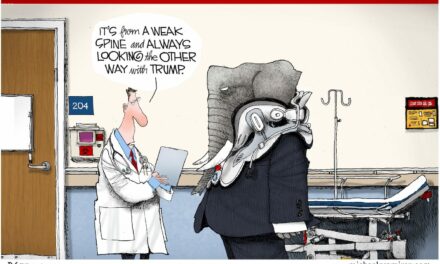We support our Publishers and Content Creators. You can view this story on their website by CLICKING HERE.
From America’s Premier Editorial Cartoonist
Our guest essay is by Bree Linquist, who is a new voice at Substack. You can follow and subscribe to her future posts HERE.
The False Promise of Third Spaces
Bree Lindquist March 17, 2024
Why this seemingly commonsense compromise is impractical, invalidating, and still comes at the expense of women and girls.
By Bree Lindquist
Gender critical thinkers should take heart in recent big wins. In the contents of the leaked WPATH files, clinicians have revealed that there is no medical or scientific precedent for experimental gender-affirming treatments on minors. More countries in sophisticated, progressive Europe are cautiously walking back their standards of care for gender-distressed children and teenagers. Throughout the western world, lawsuits for wrongful injury and unfair treatment are trickling forward with increasing speed and urgency, and will continue to do so until this dam breaks. In the meantime, however, we’re likely in for an agonizing extinction burst in which things will get a little uglier and a lot more absurd.
As the culture war rages over just what constitutes “trans rights” and whether women or men in dresses are more oppressed, a chorus of very reasonable-sounding voices has risen up in an attempt to solve this problem for everyone: “What’s the big fuss? The solution is third spaces, obviously!” Bathrooms, shelters, prisons and sports all clearly just need a third category to accommodate those we’ve talked ourselves into believing are not fully male or female. This is a solution readily offered by well-meaning people all over the political spectrum. However, it’s adorably naive to think it’s any kind of neat fix for this tangle of conflicts, even in that space that is widely considered to be the most frivolous and meaningless of the lot: women’s sports.
One such conflict is purely logistical. Creating teams, titles, and awards for a third category would require additional time, space, and funding, all of which women’s teams are already shorted on. If a monetary prize exists, it would have to come from somewhere, meaning that, at best and fairest, a male and female athlete would each need to settle for a smaller prize amount so that a winning trans competitor in a third and much smaller category could have an equal award. Because of the differences in male and female bodies and the majority of sports in question favoring male strength and speed (as opposed to, say, the superior flexibility and distance endurance of women), the winning trans-identified competitor would virtually always be male, ensuring that two out of three existing awards would go to men. While this is hardly an equal or fair outcome, it’s acceptable to many, but this is only the beginning of the proposed solution’s unraveling.
A second problem with third spaces has everything to do with an inconvenient and uncomfortable truth: trans-identified males don’t actually want third spaces. They want the spaces that will make them feel validated as women, which means being surrounded by the fairer sex in the spaces set aside for female people. Being born and raised men, they are very comfortable with the idea that what they want matters more than what women need, and that does not change when they declare that they have the soul of a lady. Most of these men have intact penises, are female-attracted, and possess an entitlement streak a mile wide. Because they care very little about encroaching on the boundaries of others and prioritize their feelings of validation, it doesn’t matter that women are uncomfortable in team locker rooms. It doesn’t matter that they are losing out on awards, titles, and monetary compensation. It doesn’t matter that these sex-segregated spaces exist for a reason, that being male violence and the unique threat it poses to women and girls. I wouldn’t claim that every trans-identified male taking advantage of a female-exclusive space is a violent rapist, of course, but every single one of them has weighed the possibility that their presence might unnerve some girls and women, and decided that their own desires were more important.
Finally, a staggering number of people today are barely aware of how shockingly new women’s spaces and categories are in sports. Female bodies, not amorphous and ethereal feminine identities that anyone may possess, have been permitted to compete at the Olympic level since the Paris Games in 1900. The appropriate category for trans-identified males in sports has existed since the first Olympic Games in Ancient Greece, and exists broadly today as “men’s sports.” Men’s sports are an open division, meaning anyone who can compete can participate regardless of sex or gender presentation, but ignoring this fact, a third category would simply give men twice as many resources, space, and prioritization in a world where they have never lacked those things. It would also provide access to men who are, like swimmer Lia Thomas, mediocre by the standards of male swimmers but able to handily outstrip most women both on the playing field and in the locker room.
The rallying cry to “be kind” and “make room at the table” for those who live differently comes from a place of compassion. The problem is that this compassion does not extend to natal women. It’s likely that some of the males competing in women’s sports today are sly grifters capitalizing on a slam-dunk opportunity, but regardless of the sincerity of the trans-identified male in question, sexed bodies, not self-declared gender identities, compete in sports, and those crying out for progress in the name of inclusivity are ignorant of how regressive it is to make sports, once more, a space dominated by male bodies.

 Conservative
Conservative  Search
Search Trending
Trending Current News
Current News 





